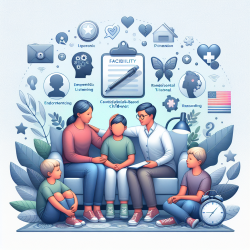Children in foster care often face significant emotional and behavioral challenges. Addressing these issues effectively is crucial for their well-being and stability. The Herts and Minds study offers valuable insights into the potential of Mentalization-Based Treatment (MBT) for improving outcomes for these vulnerable children.
The Herts and Minds study, a phase II feasibility randomised controlled trial, evaluated the effectiveness of MBT as an intervention for children in foster care with emotional and/or behavioral problems. The study's primary goal was to determine whether it is feasible to conduct a full-scale clinical trial to evaluate MBT's clinical and cost-effectiveness.
Key Findings from the Study
The study highlighted several important findings:
- Feasibility of MBT: The study found that it is feasible to train mental health practitioners to deliver MBT with treatment integrity. This suggests that MBT can be implemented effectively in real-world settings.
- Recruitment and Retention: The study demonstrated that it is possible to recruit and retain participants for a clinical trial involving children in foster care. This is a significant achievement given the challenges associated with this population.
- Acceptability of MBT: Both children and their carers found MBT to be an acceptable and credible intervention. This is crucial for ensuring high levels of engagement and participation in therapy.
- Preliminary Efficacy: While the study was not designed to provide definitive evidence of efficacy, preliminary results suggest that MBT may be effective in reducing emotional and behavioral problems in foster children.
Implications for Practitioners
For practitioners working with children in foster care, the findings from the Herts and Minds study offer several important takeaways:
- Consider MBT: Given its feasibility and acceptability, MBT should be considered as a potential intervention for children in foster care with emotional and behavioral problems.
- Focus on Training: Ensuring that practitioners receive adequate training in MBT is essential for maintaining treatment integrity and achieving positive outcomes.
- Engage Carers: The study underscores the importance of involving foster carers in the therapeutic process. Carers play a critical role in supporting the child's emotional and behavioral development.
- Further Research: While the Herts and Minds study provides promising preliminary results, further research is needed to establish the definitive efficacy and cost-effectiveness of MBT for this population.
By integrating the findings from the Herts and Minds study into their practice, practitioners can enhance their ability to support the emotional and behavioral well-being of children in foster care. For those interested in delving deeper into the research, the original paper offers a comprehensive overview of the study's methodology and results.
To read the original research paper, please follow this link: The Herts and minds study: evaluating the effectiveness of mentalization-based treatment (MBT) as an intervention for children in foster care with emotional and/or behavioural problems: a phase II, feasibility, randomised controlled trial.










